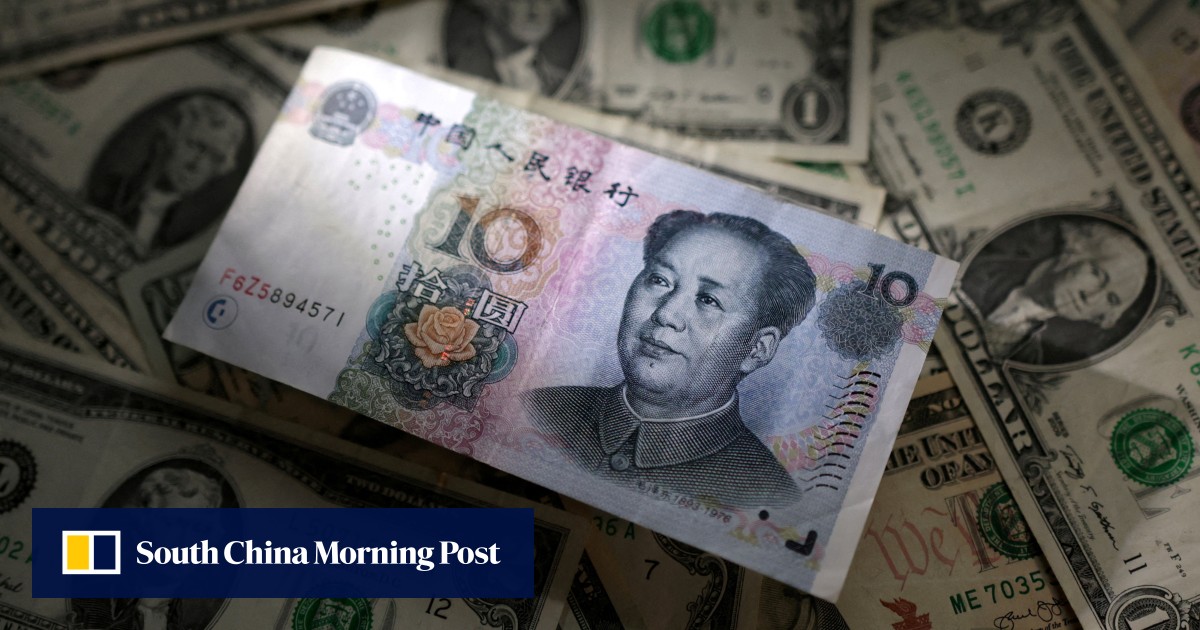
But while expectations are high that Beijing would further ease its fiscal and monetary policies to shore up growth, there may be limited room for such manoeuvres, especially when it comes to measures that could pressure the yuan exchange rate, analysts said.
China, ‘pummelled’ yuan could feel ripple effects as Fed signals 2024 rate cuts
China, ‘pummelled’ yuan could feel ripple effects as Fed signals 2024 rate cuts
“The degree of flexibility of [the yuan and US dollar] exchange rate determines the room for our expectation of monetary easing,” said analysts at Soochow Securities on Thursday.
Soochow Securities said if the yuan appreciates quicker than expected against the US dollar next year, it may also dampen consumption and inflation in China, “forcing” the PBOC to ease monetary policy further.
The yuan has lost as much as 6.2 per cent against the US dollar since the start of the year, weakening past 7.3 in September and again in October.
Pressure on the yuan has since eased, and it has hovered around 7.13 to 7.17 against the US dollar in recent weeks.
The US Federal Reserve left interest rates unchanged last week, and signalled that the historic tightening of US monetary policy over the last two years was at an end, with lower borrowing costs anticipated in 2024.
The central bank could use its medium-term lending facility to manage short- and medium-term liquidity in the banking system, while it could also use its pledged supplementary lending facility to better target medium-term lending rates, helping boost liquidity to specific sectors, Nomura said.
If Beijing asks the PBOC to turn on the money spigot, the yuan would be subject to even stronger depreciation pressures,
A quantitative easing programme that may see the PBOC bail out many residential property projects that cannot be completed on time is unlikely, Nomura added, due to potential depreciation pressure on the yuan, as well as other factors such as moral hazard concerns.
“Without relying on the PBOC’s money printing, a massive programme of rescuing development projects could push up market interest rates and crowd out other borrowers,” Nomura said earlier this month.
“However, if Beijing asks the PBOC to turn on the money spigot, the yuan would be subject to even stronger depreciation pressures, which could trigger capital flight and endanger Beijing’s campaign for yuan internationalisation.”
Stabilising the exchange rate may mean sacrificing the independence of monetary policy to a certain extent
Bank of China Securities global chief economist Guan Tao said while maintaining a stable yuan exchange rate would help to “buy time” for economic recovery, such measures would not be able to replace the “necessary policy stimulus and structural adjustment”.
“On the one hand, stabilising the exchange rate may mean sacrificing the independence of monetary policy to a certain extent,” the former official at China’s exchange regulator said in a blog post earlier this month on the website of the Economist 50 Forum, a Beijing-based think tank.
“On the other hand, stabilising the exchange rate means either depleting foreign exchange reserves or strengthening capital controls.”
Guan said a “flexible” exchange regime should “help enhance the autonomy of domestic macro policies” and reduce the need to implement capital control measures, thereby boosting the confidence of foreign investors in making long-term commitments in China.

